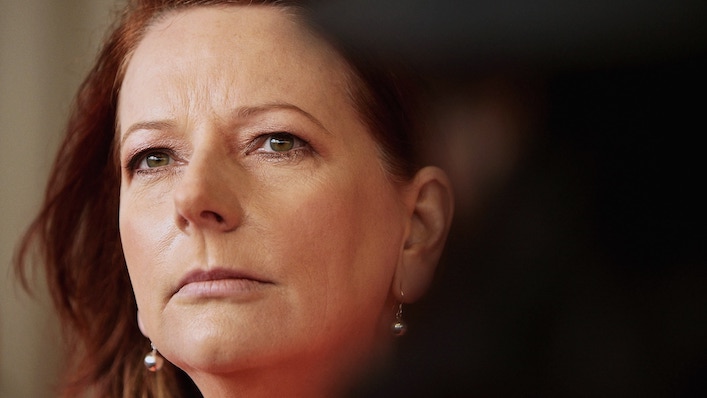Julia Gillard doco Strong Female Lead is a brutal walk of shame down memory lane

SBS’s feature-length investigation into Australia’s only female PM proves that we still have a long way to go, when it comes to holding sexism in politics accountable. Merryana Salem reviews this shameful yet necessary watch.
The reactions to SBS’s first release of the Australia Uncovered series has left Julia Gillard trending on Twitter since Sunday night. Strong Female Lead is a celebration of Australia’s first and only woman PM, but it’s also a brutal walk of shame down memory lane.
See also
* The 25 best documentary movies on Netflix Australia
* All new streaming movies & series
Using only archival footage and audio, established Australian documentary filmmaker Tosca Looby allows the media’s unrelenting smear campaign during Gillard’s tenure as PM to speak for itself. There is no current retroactive commentary or interviews: just the shameful reality of the press, public, and parliament’s disdain and misogyny for then-PM Julia Gillard.
Looby leaves no stone unturned, structuring Strong Female Lead as a timeline stretching from the infamous 2010 leadership spill that made Gillard PM, to the spill in 2013 that ended her tenure. Before the barrage of clips from one of the Australian press’ most unbecoming eras begins, Looby presents another timeline, this one detailing when countries around the world elected their first female leaders. Australia is factually situated among the world’s latecomers, foreshadowing a cultural disregard for women in Australia that we know has only continued.
The culprits Looby portrays are so numerous that it would be far more efficient to list who isn’t to blame in the mass of misogyny levied against Julia Gillard. Looby demonstrates with archival interviews, press, conferences, and question times, how very few people permitted Gillard freedom from the backstabber archetype.
Perhaps a certain amount of political resistance would have been appropriate from the opposition leader, Tony Abbott. But his speeches at several rallies advocating to “ditch the witch,” remind the viewer of Abbott’s cruel and blatant displays of total disrespect for his political rival’s humanity during this time. Abbot’s montages rhyme horrendously with footage of Alan Jones in an infamous instant where the radio shock-jock postulated that Gillard’s father “died of shame” days after his passing.

Political cartoonist Larry Pickering’s campaign, in which he published daily grotesque cartoons implying Gillard’s infidelity with President Barack Obama, is displayed in full too. Again, these images and moments are left to speak for themselves and what they say, loud and clear, is that Australia’s current epidemic of misogyny in politics is far from new.
Pickering, Abbott, and Jones were undoubtedly major players in the game against Gillard, but Looby is meticulously careful not to portray them as ringleaders. Rather, she positions them as major threads in a tapestry of cultural dissent against Gillard and what she represented for women in Australian politics—a tapestry that included journalists and daytime television host’s invasive inquiries about Gillard’s marital status, fashion choices, and even her partner’s sexuality.
It was hardly just the press, but with her brutally honest timeline, Looby shows how the culture of misogyny maintained by the press in regard to Gillard emboldened the creation of the ABC sitcom, At Home With Julia. The series parodied the PM’s private life, and Looby provides the cringe-worthy footage of its cold-open that portrayed Gillard and her partner having sex on the Australian flag.
Despite its cancellation, the series was voraciously consumed by the same general public who were joining Facebook groups titled with such charming labels as ‘Julia smokes her own pubic hair’, ‘Julia Gillard is a fat mole’ and ‘we hate julia gillard’. Looby asks us to consider a trickle-down culture of misogyny, that starts with Gillard’s political peers and ends in public comments on Facebook.
But among the naming and shaming of Australia’s disrespect for Gillard during her Prime Ministership, there is also a dedication to Gillard’s unshakeable grace. For every montage of journalistic disrespect and collage of cruel social media posts, Looby answers with the fact of Gillard’s gracious conduct. Gillard’s humour, wit, and indomitable dignity is clear in the clips Looby chooses to show—of her laughing off enquiries about her romantic life, staving off insinuations of her party’s lack of faith, and of her determination to centre discussions on her work.
Of course, no documentary on Gillard would be complete without her historically world famous rebuttal to Tony Abbott’s accusation of misogyny against her party. To this day, the audio of Gillard’s proclamation, “I will not be lectured about sexism and misogyny by this man…” continues to be immortalised in TikToks and songs, which Looby positions as one of Gillard’s many legacies.
@brontecrawleyGet em Julz ##australianpolitics ##australia ##dance ##fyp
Strong Female Lead is not an uncritical presentation of the sexist critique levelled at Gillard. That is, Looby isn’t presenting Gillard’s Prime Ministership as one without flaws beyond the external, aggressively unjust criticism levelled at her. Looby instead allows her curated archive to paint a portrait of a leader whose faults were exaggerated and achievements omitted, drowned in a cultural sea of systemic and social misogyny. But the waters are beginning to recede.
It’s a difficult and downright shameful watch, but Strong Female Lead is also a respectful and hopeful one. This country is yet to see a woman follow in Julia Gillard’s footsteps, but Looby’s documentary is small consolation that, finally, history has begun to remember our first and (so far) only female prime minister with the respect for which she should never have had to fight so hard. And that, unfortunately, we still have a long way to go.

















